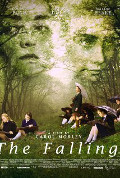
Directed by
Carol Morley
102 minutes
Rated M
Reviewed by
Bernard Hemingway

The Falling
Synopsis: Lydia (Maisie William) lives with her agoraphobic mother (Maxine Peake) and older brother .Kenneth (Joe Cole) and shares her teenage angst with her best friend Abbie (Florence Pugh). Their intensely private bond is broken once Abbie starts having sex and strange things start happening, first to the two girls then their classmates and female teachers.
Carol Morley’s film is part 1960s coming-of-age drama, part girl’s school psychological horror story, a combination which comes off thanks to Morley’s intimate directorial touch, fine performances, Agnes Godard’s evocative cinematography and a tonally empathetic score by Tracey Thorn,
Much as was Morley’s previous work, the documentary Dreams Of A Life, The Falling (a title which refers to the girls’ fainting) is a quintessentially English film. It is also arguably the best 60s England coming-of-age film since Lone Scherfig’s An Education.
Whilst the place and time are very different, Australian audiences in particular will recall Peter Weir’s 1975 girl’s school classic, Picnic At Hanging Rock. There is the same mixture of repressed teenage libidinal urgings, romantic fancy and psychosomatic disruption as the lovely Wordsworth-reading Abbie inspires her classmates and Lydia in particular with ideas of a great love and the strait-laced staff (notably Monica Dolan as the frighteningly cold-as-ice headmistress and a remarkable turn from Greta Scacchi as the uptight Miss Mantel) try to quash the changing spirit of the times and Godard’s camera embraces the melancholy beauty of pastoral England in Autumn (one thing that is not explained is as they live in a pokey semi-detched why and how Lydia’s hairdresser Mum manages to send her daughter to an ivy-covered private school).
But whilst The Falling drinks from the same pool as Picnic that film was essentially a simple mystery story. The strength of Morley’s film and this is something that was clearly sounded in Dreams Of A Life is the director's deep empathy with her characters not with just her two leads but whether they be the lonely spinster. Miss Mantel, the tentatively yearning Susan (Anna Burnett) or Lydia’s troubled mother. In this sense each character is synecdochally related to the whole and the “hysterical contagion” which is the story’s old fashioned focal point is a kind of pathological manifestation of an unspoken female communality.
The Falling is a modestly-scaled film but also a richly resonant mixture of kitchen-sink realism and poetic imagination.

Want more about this film?


Want something different?




